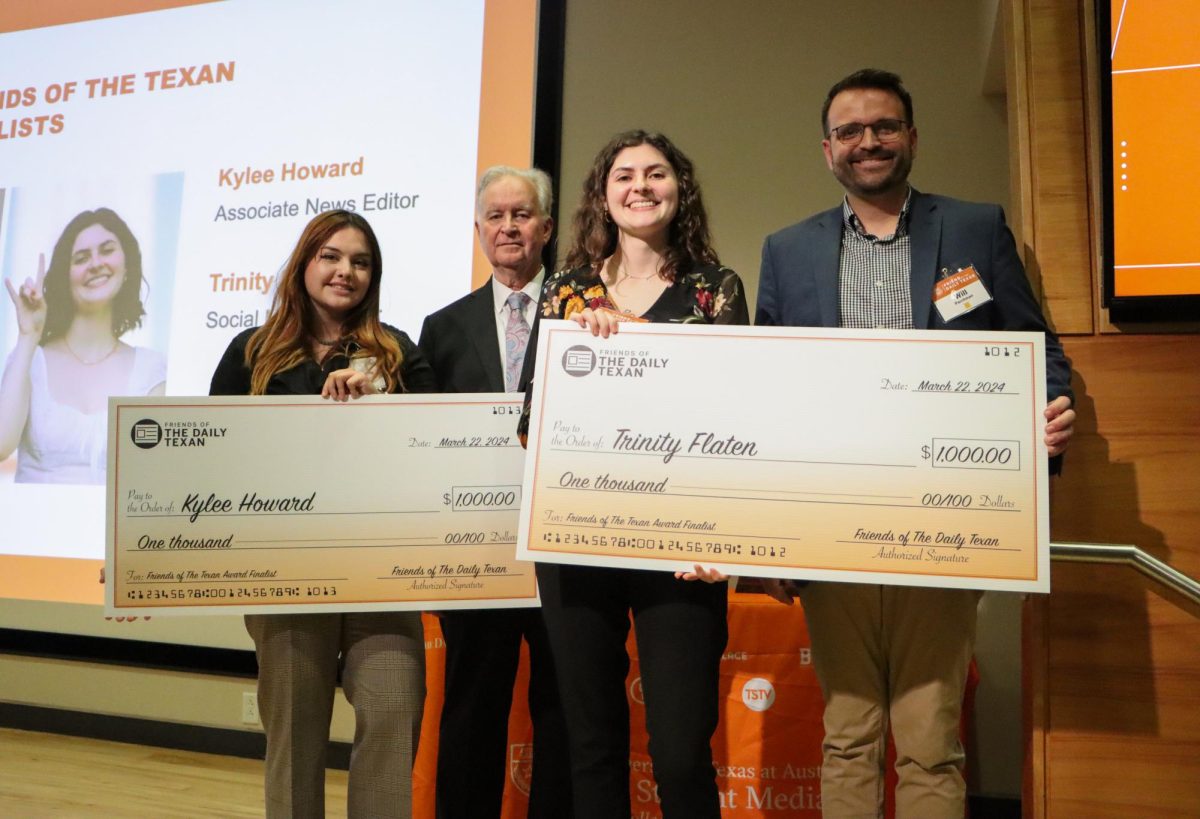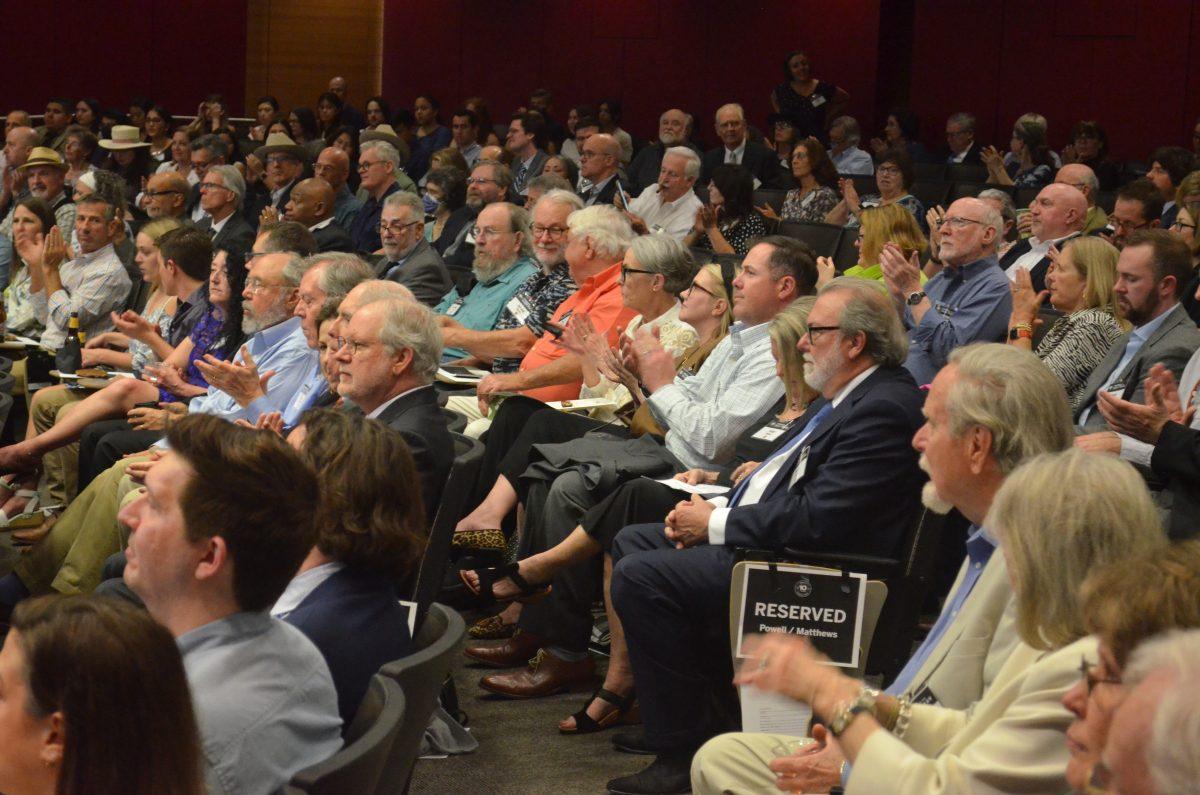 John Schwartz (BA ’79, JD ’84) is a climate change writer for the New York Times, where he has worked since 2000 covering science, technology, space travel, legal affairs and more. Before that, he worked at the Washington Post and at Newsweek magazine. He is the author of two books, Oddly Normal (2012, Gotham) and Short: Walking Tall When You’re Not Tall At All (2010, Flash Point). We caught up with him recently at the New York Times offices to learn more about his career path and his unusual story of how he became editor of The Daily Texan.
John Schwartz (BA ’79, JD ’84) is a climate change writer for the New York Times, where he has worked since 2000 covering science, technology, space travel, legal affairs and more. Before that, he worked at the Washington Post and at Newsweek magazine. He is the author of two books, Oddly Normal (2012, Gotham) and Short: Walking Tall When You’re Not Tall At All (2010, Flash Point). We caught up with him recently at the New York Times offices to learn more about his career path and his unusual story of how he became editor of The Daily Texan.
Did you start at The Texan as a freshman or later?
Much later. I finished my four years of undergraduate work and then didn’t know what I was going to do, and spent a year in between undergraduate and graduate school taking more classes. I initially started working at [the student magazine] UTMost because magazine writing appealed to me, and I didn’t know that much about newspapers. And during that year when I was working at UTMost, I wandered downstairs to The Texan and asked if they needed a columnist.
Don Puffer came in as editor — he became editor in that summer [1981], and during that summer, he was caught plagiarizing editorials from the New York Times, something that was brought to light by Jay Adkins, who had been UT student body president and was going to law school. There was a lot of coverage of this because the staff walked out on Don, who I’ve always felt kind of sorry for because he was a kid. I mean, we were all kids, right? And he didn’t know how to deal with this. The staff walks out on him, and he resigns. And TSP tries to figure out what to do next, and someone asked me if I could be interim editor until they could appoint a new editor.
I was in The Texan all the time as a columnist, but not part of the walkout. The fact that I was over at UTMost meant I was known, but not part of the faction. I said, “Ok, I can do that.”
How long were you in that role?
Middle or late fall into the spring. I ran the paper for the rest of the year, and they did not walk out on me. We won awards, and it was fine. When I finished as editor, I felt it was important to let the next people run the paper. So, I finished law school. I took the bar, but I had decided by then that I didn’t really want to practice law because journalism was exciting, different and fun. One more person ruined by The Texan.
You’ve written about science, NASA, climate change, business, etc. What’s guided that pathway?
I’ve written about climate change for the last two years. I’ve written about the space program. I’ve also been the national legal correspondent and been a technology writer and been on the business desk. And general science writing.
There’s no pathway. I’ve never had a strategy. I’ve just tried to go where the work is. When I got to Newsweek, it was because I’d been a stringer for them. When I got to the main Newsweek, the editor who liked me was the business editor, and he invited me to join his staff first. I said, “I don’t know anything about business.” He said, “Read a book.” I was a business writer there for six years, with an emphasis on technology because that interested me.
But the job that was open at the Washington Post was a science writer job, covering the Food and Drug Administration. I was able to convince them that I wasn’t a science writer but I would read a book. And they hired me also because I said, “This is a regulatory beat, and I think my law degree could be of great value here in terms of understanding the regulatory process and legal challenges.” The fact that they bought that still amazes me.
At the Post, I was a general science writer, also covering the Food and Drug Administration, and that beat sort of petered out. So I went over to be a business writer because that’s where the work was. I was a technology writer in the business section at that point, and that’s what the New York Times was looking for at that moment. And they came after me. I think if I’d tried to plan this out, I would have screwed it up.
You’ve seen the business change dramatically over the course of your career. What do you think has been the biggest change, and what do you think stays the same?
The biggest change is not technology, though the technology changes and requires you to step up. The biggest change is not making money. The biggest change is the decline in print advertising, the loss of classifieds, the incredible financial pressure on journalism. Which means that places like the New York Times go through rounds of buyouts and layoffs, and you lose a lot of institutional memory and talent. It means that papers that don’t try as hard as the Times to preserve standards and to keep building — because the Times has done an amazing job in the face of these losses to build new revenue streams. A million digital subscriptions? It’s unbelievable.
So, the biggest change is scarcity and what that does. And yet the Times still has all these international bureaus. We’re still on the ground in Iraq. We’re still on the ground wherever things happen, all over the United States. We still put people on planes. Other people aggregate us without ever going anywhere, but the paper still finds ways to do this thing.
At the same time, what hasn’t changed is telling stories. The cliche is we are exploring new ways to tell the stories using digital and visual tools that did not exist before, and that’s true. But ultimately, it’s still just telling stories, which is a relief to a guy like me because that’s all I ever wanted to do. I’m willing to explore any possible way to do it, but I’ve just got to tell stories. And I’m glad that there’s a place that allows me to do it.
Do you still feel like a Texan at heart, even after all this time in the Northeast?
Oh yeah, that’s my identity. If you come over to my desk, you’ll see three volumes of the Handbook of Texas. I get really boring talking about Texas.
What did working for The Texan do for you?
It changed my life. I was probably going to be a lawyer, and not a very good one. And instead, I found something I was pretty good at, and I was able to do it. This idea that you find your thing — and it was right there in front of me. In the morning, I was at the law school taking law classes and having lunch with the law students. In the afternoon and into the evening, I was at The Texan and working with journalists and hanging out with them. And I could see these people are good and smart, but I feel more like these people. This is my tribe. Once you feel that, once that hits you, then you can go after it. I went from someone who was sort of aimlessly saying, “Well, I could do this,” to saying, “I could do this. I’m going to take a chance on this. It’s exciting.” It’s still exciting. I can’t believe they let me do it.
Alicia Dietrich is the Director of Public Affairs in the College of Fine Arts at The University of Texas at Austin. She serves as an officer on the board of The Friends of The Daily Texan. She worked at The Daily Texan from 2002 to 2004 as an Associate Managing Editor, Copy Desk Chief, copy editor, wire editor and features writer.


